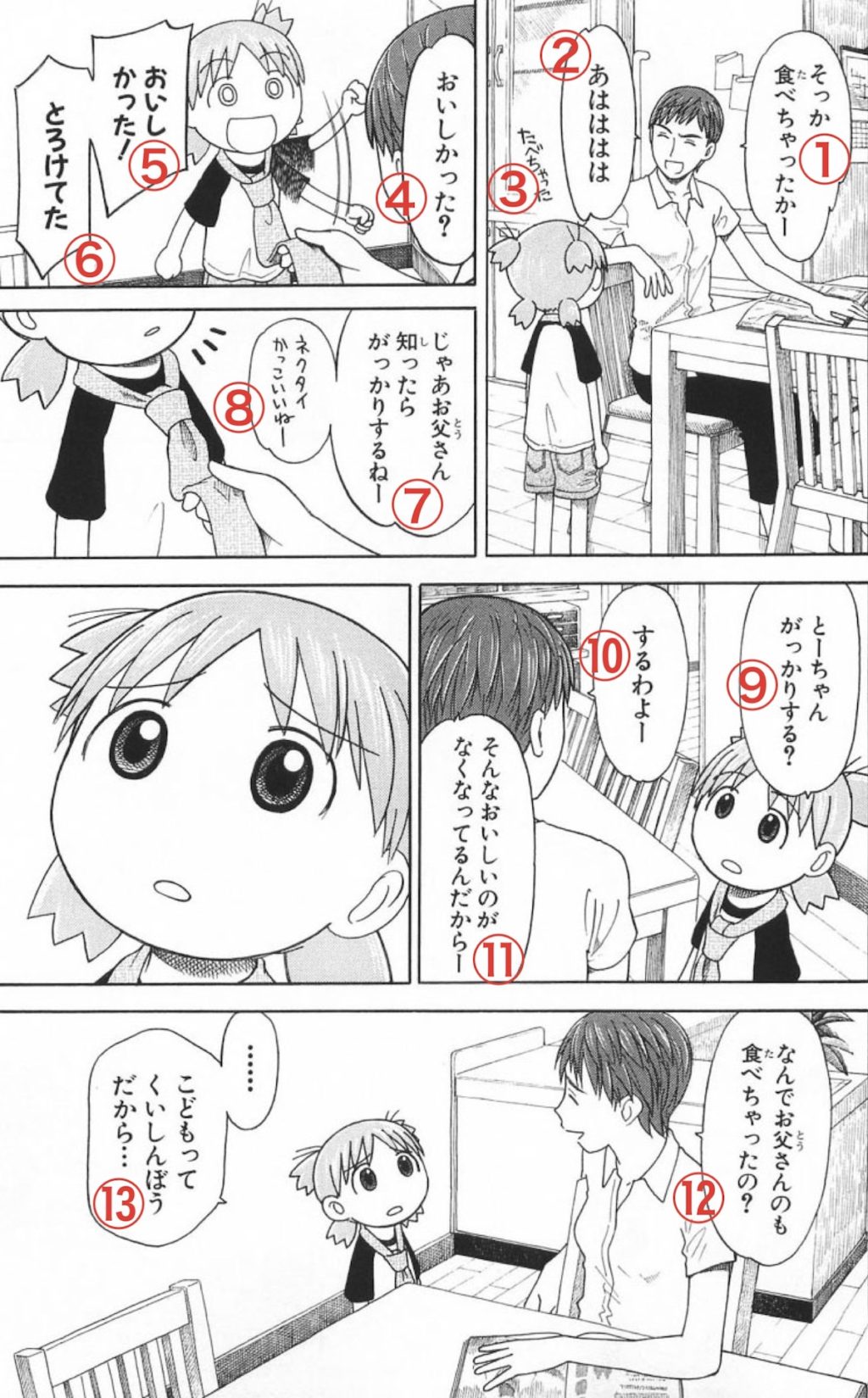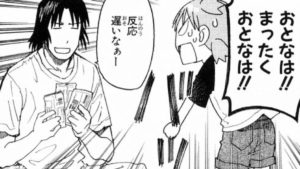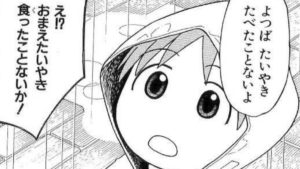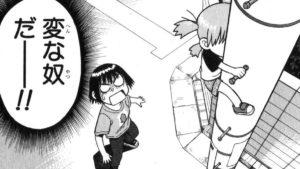Let’s learn Japanese with our analysis of manga. We will analyse a manga snippet from Yotsubato! (よつばと!) Volume 6.
CONTENTS
Manga Snippet
Sentences
Mouseover (tap on a smartphone/tablet) to reveal the censored romaji and English translation.
-
そっか 食べちゃったかー
sokka tabechatta kā
I see. You ate it! -
あはははは
ahahahaha
Ahahahaha. -
たべちゃった
tabechatta
I ate it. -
おいしかった?
oishikatta?
Was it tasty? -
おいしかった!
oishikatta!
It was tasty! -
とろけてた
toroketeta
It was melting -
じゃあお父さん知ったらがっかりするねー
jā otōsan shittara gakkari suru nē
Then your dad will be disappointed when he finds out, won’t he? -
ネクタイかっこいいねー
nekutai kakkoii nē
Cool tie, isn’t it. -
とーちゃんがっかりする?
tōchan gakkari suru?
Daddy will be disappointed? -
するわよー
suru wa yō
Sure he will. -
そんなおいしいのがなくなってるんだからー
sonna oishii no ga nakunatteru ndakarā
Since something that tasty disappeared. -
なんでお父さんのも食べちゃったの?
nande otōsan no mo tabechatta no?
Why did you eat your dad’s too? -
こどもってくいしんぼうだから…
kodomo tte kuishinbō dakara…
Because children are gluttons…
Analysis of Manga
-
「そっか 食べちゃったかー」
- そっか (expression) – I see, right
- 食べ (verb) – eat
- ちゃった (auxiliary) – used to make the action sound unfavourable/unintentional EXAMPLES
- か (particle) – expresses that you are impressed, surprised, moved, etc.
-
「あはははは」
- あはははは – laughing loudly
-
「たべちゃった」
- たべ (verb) – eat
- ちゃった (auxiliary) – used to make the action sound unfavourable/unintentional
-
「おいしかった?」
- おいしかった (i-adjective) – was tasty (when it is a question, the intonation of た goes up)
-
「おいしかった!」
- おいしかった (i-adjective) – was tasty
-
「とろけてた」
- とろけてた (verb) – was melting EXAMPLES
-
「じゃあお父さん知ったらがっかりするねー」
- じゃあ (conjunction) – then, well then
- お父さん (noun) – dad
- 知った (verb) – get to know, find out
- ら (auxiliary) – if, when (following verb ta-form)
- がっかりする (verb) – be disappointed
- ね (particle) – indicates request for confirmation/agreement; won’t he?
-
「ネクタイかっこいいねー」
- ネクタイ (noun) – tie
- かっこいい (i-adjective) – cool, good looking
- ね (particle) – indicates request for confirmation/agreement; isn’t it?
-
「とーちゃんがっかりする?」
- とーちゃん (noun) – daddy
- がっかりする (verb) – be disappointed (when it is a question, the intonation of る goes up)
-
「するわよー」
- する (verb) – will do
- わ (particle) – adds feminine flavour to the sentence
- よ (particle) – used to make the listener aware of the information EXAMPLES
-
「そんなおいしいのがなくなってるんだからー」
- そんな (na-adjective) – such, that kind of
- おいしい (i-adjective) – tasty, delicious
- の (particle) – makes an adjective into a noun; one, thing
- が (particle) – indicates subject
- なくなってる (verb) – has disappeared, be gone
- んだ – used to make a sentence into an explanation
- から (particle) – because, since (following a clause)
-
「なんでお父さんのも食べちゃったの?」
- なんで (adverb) – why
- お父さん (noun) – dad
- の (particle) – indicates possession
- も (particle) – too, also
- 食べ (verb) – eat
- ちゃった (auxiliary) – used to make the action sound unfavourable/unintentional
- の (particle) – indicates question
-
「こどもってくいしんぼうだから…」
- こども (noun) – children
- って (particle) – indicates sentence topic in colloquial speech EXAMPLES
- くいしんぼう (noun) – glutton
- だ (particle) – makes a sentence declarative (attached to a noun or na-adjective)
- から (particle) – because, since (following a clause)
Examples
Verb + ちゃう/ちゃった (do/did something unfavourable unintentionally)
昨日飲みすぎちゃった。
kinō nomi sugi chatta.
I drank too much yesterday.
お腹が空いてると、ついイライラしちゃう。
onaka ga suiteru to, tsui iraira shi chau.
When I’m hungry, I get irritated unintentionally.
It is the casual and colloquial form of verb te-form + しまう. When its te-form ends in で, it is contracted to じゃう.
- 食べてしまう → 食べちゃう
- 飲んでしまう → 飲んじゃう
とろける vs とける (melt)
このトロの刺身、口の中でとろける〜!
kono toro no sashimi, kuchi no naka de torokerū!
This toro (fatty tuna) sashimi melts in my mouth!
アイスクリームは溶けちゃうから、すぐ冷凍庫に入れて。
aisu kurīmu wa toke chau kara, sugu reitōko ni irete.
Ice cream will melt so put it in the freezer quickly.
The difference between とろける and とける:
- とろける – mainly used for food which melts in heat such as in the mouth or oven (e.g. raw fish, meat, cheese, etc) often to express its deliciousness
- とける – used for food which melts at room temperature (e.g. ice, ice cream, etc)
よ (used to make the listener aware of the information)
わたし、明日からダイエットするよ!
watashi, ashita kara daietto suru yo!
I will go on a diet from tomorrow!
大丈夫、なんとかなるよ!
daijōbu, nantoka naru yo!
No worries, everything will be ok!
って (indicates sentence topic in colloquial speech)
あの人って、ちょっと変わってるね。
ano hito tte, chotto kawatteru ne.
That person is a bit weird, isn’t he?
恐竜って、なんで絶滅したの?
kyōryū tte nande zetsumetsu shita no?
Why did dinosaurs go extinct?
When it is used to indicate sentence topic, it can be replaced with the topic particle は. But as って has the nuance of “speaking of”, it is often used when the speaker brings up a new topic or wants to emphasise the topic. So って usually cannot be used when the topic has already been mentioned.
A: 図書館って近くにありますか? (Is there a library nearby?)
B: ✖︎ 図書館って近くにありますよ。✔︎ 図書館は近くにありますよ。(There is a library nearby)
However, it can be used for emphasis even after the topic has been mentioned.
A: Mr.マリックって知ってる? (Do you know Mr. Maric?)
B: Mr.マリックって、あの有名なマジシャンでしょ?もちろん知ってるよ! (Are you talking about MR. MARIC, that famous magician? Of course I know!)
Support Easy Peasy Japanesey
If you enjoy our content, please consider supporting Easy Peasy Japanesey. Your support will help keep us going. Thank you for your support!



